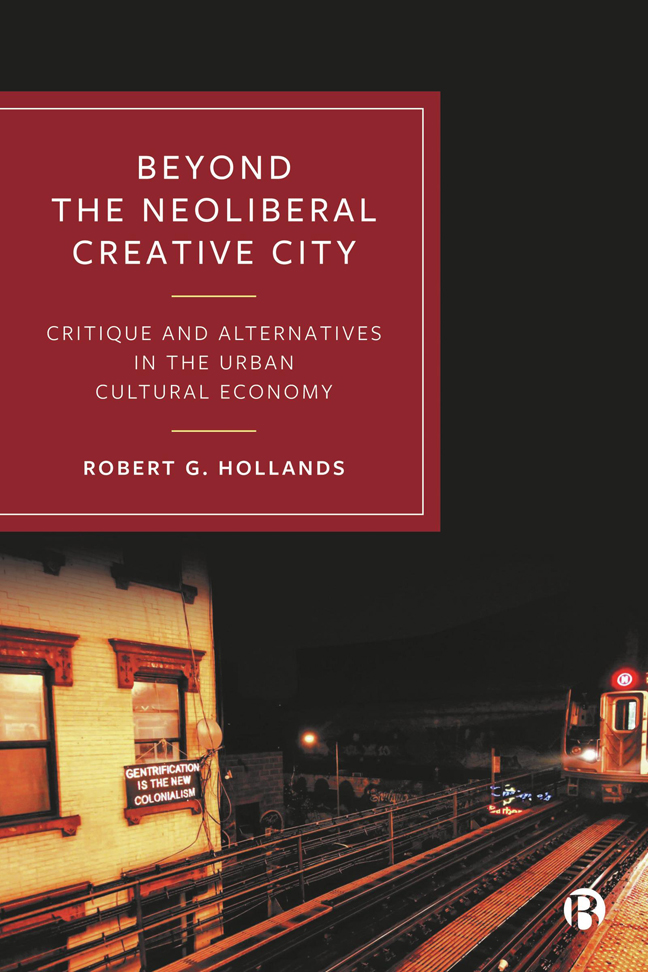Book contents
- Frontmatter
- Dedication
- Contents
- List of Figures, Tables and Case Studies
- About the Author
- Preface
- 1 Neoliberalism, Creativity and Cities
- 2 Urban Entrepreneurialism: The Emergence of the Cultural Economy
- 3 Critiquing the Neoliberal Creative City: But Long Live Alternative Creative Spaces!
- 4 Urban Cultural Movements and Anti-Creative Struggles
- 5 Neoliberal Nightlife and its Alternatives
- 6 Rethinking the Tourist City: Contestation and Alternative Cultural Tourism
- 7 Creative Polarization, Division and Exclusion
- 8 Beyond the Neoliberal Creative City
- Notes
- References
- Index
8 - Beyond the Neoliberal Creative City
Published online by Cambridge University Press: 25 January 2024
- Frontmatter
- Dedication
- Contents
- List of Figures, Tables and Case Studies
- About the Author
- Preface
- 1 Neoliberalism, Creativity and Cities
- 2 Urban Entrepreneurialism: The Emergence of the Cultural Economy
- 3 Critiquing the Neoliberal Creative City: But Long Live Alternative Creative Spaces!
- 4 Urban Cultural Movements and Anti-Creative Struggles
- 5 Neoliberal Nightlife and its Alternatives
- 6 Rethinking the Tourist City: Contestation and Alternative Cultural Tourism
- 7 Creative Polarization, Division and Exclusion
- 8 Beyond the Neoliberal Creative City
- Notes
- References
- Index
Summary
This book began by suggesting that the development of the cultural economy has been heralded as the saviour of the modern capitalist city. Arguing against urban creativity therefore seems counter-intuitive. Yet beneath this contemporary ‘urban makeover’ lie a series of intractable social problems such as socio-spatial polarization, hyper-gentrification, job precarity and environmental concerns. Throughout the book I have sought to show some of the major shortcomings of the neoliberal creative city. This final chapter brings together criticism of this divisive type of city with the pressing need to envision a different kind of urban scenario.
The first part of the chapter briefly reviews the main limits of the neoliberal creative city. It then summarizes some of the common characteristics of alternative practices in the different fields of the urban cultural economy discussed in Chapters 3, 5 and 6 (art and culture, nightlife and cultural tourism). This is followed by three further sections concerned with going beyond the neoliberal creative city. They include resetting art and culture within a foundational economy (O’Connor, 2022), pursuing creative justice (Banks, 2017a) and striving for cultural sustainability (Oakley and Banks, 2020). A final section concludes by focusing more broadly on the issues of decommodification, the commons, urban justice and sustainability. In doing so there is not only an emphasis on what needs to change but how we might begin to think of moving towards a more truly creative, just and sustainable future.
Critique and alternatives to the neoliberal creative city
I defined the neoliberal creative city as the state-facilitated marketization of creativity and the development of a competitive place-based urban cultural economy. It is characterized by creative image-building, an obsession with global rankings and attracting creative workers into its orbit. There is also a focus on large-scale culture-led regeneration projects, branded arts, entertainment districts and high-value tourist attractions.
One of the arguments that has been made throughout this book is that on the surface, this type of city appears quite seductive. It is also an extremely popular urban moniker. It includes not only ‘superstar cities’ like London, Paris and New York, but a range of other places around the world including cities from the Global South and even smaller cities from the UK, Europe, Asia and North America.
- Type
- Chapter
- Information
- Beyond the Neoliberal Creative CityCritique and Alternatives in the Urban Cultural Economy, pp. 156 - 177Publisher: Bristol University PressPrint publication year: 2023



